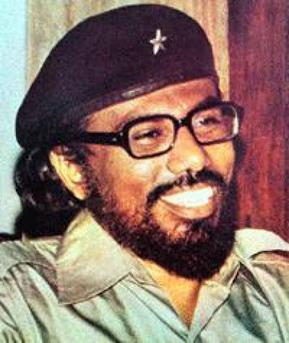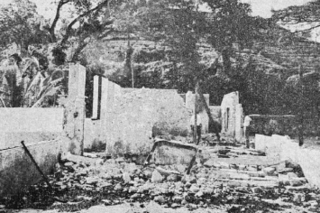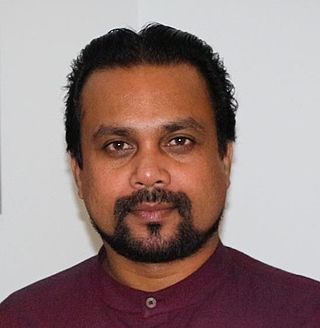
Parliamentary elections were held in Sri Lanka on 2 April 2004. The ruling United National Party of Prime Minister Ranil Wickremesinghe was defeated, winning only eighty two seats in the 225-member Sri Lankan parliament. The opposition United People's Freedom Alliance won 105 seats. While this was eight seats short of an absolute majority, the Alliance was able to form a government.

Janatha Vimukthi Peramuna is a Marxist–Leninist communist party in Sri Lanka. The party was formerly a revolutionary movement and was involved in two armed uprisings against the government of Sri Lanka: once in 1971 (SLFP), and another in 1987–89 (UNP). The motive for both uprisings was to establish a socialist state.

Patabendi Don Jinadasa Nandasiri Wijeweera, better known as Rohana Wijeweera, was a Sri Lankan Marxist political activist, revolutionary and the founder of the Janatha Vimukthi Peramuna. Wijeweera led the party in two unsuccessful insurrections in Sri Lanka, in 1971 and 1987 to 1989.

The 1971 Janatha Vimukthi Peramuna (JVP) insurrection was the first of two unsuccessful armed revolts conducted by the communist Janatha Vimukthi Peramuna (JVP) against the socialist United Front Government of Sri Lanka under Prime Minister Sirimavo Bandaranaike. The revolt began on 5 April 1971 and lasted until June of that year. The insurgents held towns and rural areas for several weeks, until the regions were recaptured by the armed forces, following strong support from friendly nations that sent men and material. Although this first attempt to seize power was quickly crushed by force, in 1987 the JVP launched a low-intensity insurgency in the island's southern, central and western regions that lasted several years.

The 1987–1989 JVP insurrection, also known as the 1988–1989 revolt or the JVP troubles, was an armed revolt in Sri Lanka, led by the Marxist–Leninist Janatha Vimukthi Peramuna, against the Government of Sri Lanka. The insurrection, like the previous one in 1971, was unsuccessful. The main phase of the insurrection was a low-intensity conflict that lasted from April 1987 to December 1989. The insurgents led by the JVP resorted to subversion, assassinations, raids, and attacks on military and civilian targets while the Sri Lankan government reacted through counter-insurgency operations to suppress the revolt.
The Jathika Nidahas Peramuna (JNP) or National Freedom Front (NFF) is a political party in Sri Lanka which was formed by ten JVP parliamentarians led by Wimal Weerawansa, as a breakaway group of the Janatha Vimukthi Peramuna (JVP).

Weerasangilige Wimal Weerawansa is a Sri Lankan politician, Member of Parliament and current leader of the National Freedom Front (NFF). Weerawansa has served many cabinet positions, including Minister of Industries from 2020 to 2022, Minister of Small and Medium Business and Enterprise Development, Industries and Supply Chain Management from 2019 to 2020, Minister of Housing and Social Welfare in 2018 and the Minister of Construction and Housing from 2010 to 2015.
Sellapperumage Saman Piyasiri Fernando, was the military wing leader of the Janatha Vimukthi Peramuna during the 1987-89 insurrection in Sri Lanka, the JVP's military wing also known as Deshapremi Janatha Viyaparaya (DJV). His position in the JVP as the military commander was organizationally higher than the position of Rohana Wijeweera, the founder of the JVP.

Inter-University Students' Federation is a confederation of students' unions across Sri Lanka. Around 70 students' unions are affiliated with the confederation, accounting for more than 95% of all higher and further education unions in Sri Lanka. The IUSF is the organization that is given leadership to whole university students in Sri Lanka. It is the largest student organization in Sri Lanka to date. It represents the voice of student councils and action committees in 15 higher education institutes including all major universities and technical colleges in Sri Lanka.

Deshapremi Janatha Vyaparaya was a militant organisation in Sri Lanka. It was widely considered to be the military branch of the Marxist–Leninist Janatha Vimukthi Peramuna and had been designated as a terrorist organisation by the Sri Lankan government.

Premakumar Gunaratnam in politics, is a former JVP leader and political activist in Sri Lanka who later became an Australian citizen and the current general secretary of FLSP.
Amarasinghe Kankanamlage Somawansa, commonly as Somawansha Amarasinghe, was a Sri Lankan politician, and the 4th leader of Janatha Vimukthi Peramuna, after Rohana Wijeweera, Saman Piyasiri Fernando and Lalith Wijerathna and served as its leader for 23 years until February 2, 2014. He is often described as a strategic leader who socialized the ideological struggle of the JVP into socialism through the nationalist struggle to save the country from Tamil separatist terrorism.
Terrorism in Sri Lanka has been a highly destructive phenomenon during the 20th and 21st centuries, especially so during the periods of the Sri Lankan Civil War (1983–2009) and the first (1971) and second JVP insurrections (1987–1989). A common definition of terrorism is the systematic or threatened use of violence to intimidate a population or government for political, religious, or ideological goals. Sri Lanka is a country that has experienced some of the worst known acts of modern terrorism, such as suicide bombings, massacres of civilians and assassination of political and social leaders. Terrorism has posed a significant threat to the society, economy and development of the country. The Prevention of Terrorism Act of 1978 is the legislation that provides the powers to law enforcement officers to deal with issues related to terrorism in Sri Lanka. It was first enacted as a temporary law in 1979 under the presidency of J. R. Jayewardene, and later made permanent in 1982.
Operation Combine was a special operation established by the Sri Lanka Army from 4 August 1989 to February 1990 as counterinsurgency operation with support of the Sri Lanka Police against the Janatha Vimukthi Peramuna (JVP) which had launched a its second insurgency in 1987.
Wijayamuni Devage Athula Nimalasiri Jayasinghe was a Sri Lankan revolutionary and politician. A JVP leader of the 1971 JVP insurrection, Jayasinghe was later elected to the Sri Lankan Parliament and served as a Deputy Minister of Power and Energy.
The National People's Power (NPP), or Jathika Jana Balawegaya (JJB), is a political alliance in Sri Lanka. It was established in 2019 by Anura Kumara Dissanayake, leader of the Janatha Vimukthi Peramuna.
The attack on the Sri Lankan Armed Forces (SLAF) base in Pallekele was an attack carried out by the Patriotic People's Armed Troops together with the Patriotic People's Movement, which were armed divisions of the Janatha Vimukthi Peramuna. The attack was led by Keerthi Vijayabahu, as a preparation for the 1987-1989 JVP insurrection.
In March 1971, various leftist groups in the Dominion of Ceylon protested against U.S. involvement in the Vietnam War.
Communism in Sri Lanka dates back to 1935, when the Lanka Sama Samaja Party was founded by Trotskyists who campaigned for freedom and independence of Sri Lanka which was then a colony of the British Empire and known as Ceylon.
Socialist Students' Union of Sri Lanka (SSU), also known as Samajavadi Shishya Sangameya, is a students' union in Sri Lanka that operates as the students' wing of the Marxist-Leninist Janatha Vimukthi Peramuna.











